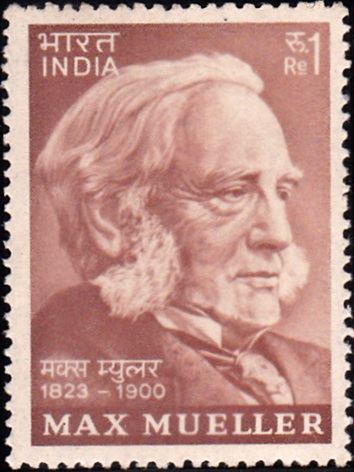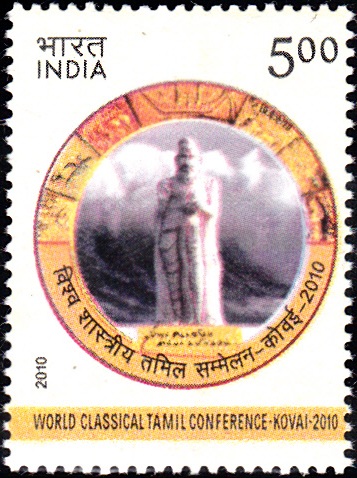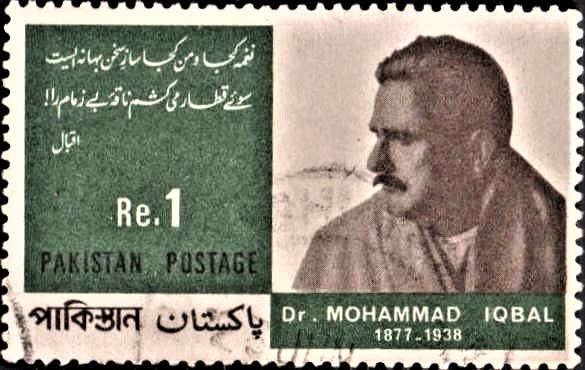
India on Max Mueller
A commemorative postage stamp on Max Müller, a German-born philologist, Indologist and orientalist, promoted Turanian family of languages [a part of ‘Personalities Stamps Series‘] :
Issued on Jul 15, 1974
Issued for : The Posts and Telegraphs Department is privileged to bring out a stamp in honour of Max Mueller.
Description of Design : The stamp is vertical and depicts the portrait of the personality.
Type : Stamp, Mint condition
Colour : Red Brown
Denomination : 1 Re.
Overall size : 3.91 x 2.90 cms.
Printing size : 3.56 x 2.54 cms.
Perforation : 13 x 13
Watermark : Printed on unwatermarked Adhesive stamp paper
Quantity printed : 2 Million
Number per issue sheet : 35
Printing process : Photogravure
Designed and printed at : India Security Press, Nasik Road
Name : Friedrich Max Müller
Born on Dec 6, 1823 at Dessau, Duchy of Anhalt, German Confederation
Died on Oct 19, 1900 at Oxford, Oxfordshire, England
About :
- Max Mueller was born at Dessau in Germany in 1823, the only son of Wilhelm Mueller, a distinguished poet, some of whose poems were set to music by Franz Schubert.
- Max Mueller attended the grammar school in his native town till 1836. He then entered the University of Leipzig in 1841 with the intention of studying Latin and Greek. However studying these languages proved somewhat tiring to him, and when he heard of the foundation of a Chair in Sanskrit, he took to the study of the language with deep devotion and started learning that language.
- Taking his doctorate in philosophy in 1943, Max Mueller proceeded to the University of Berlin in 1844 to continue his work on Sanskrit and philosophy under Franz Bopp, the founder of the Science of Comparative Philosophy, and under Friendrich von Schelling, the eminent Philosopher. In 1846, he went to England, with an introduction to the Prussian Minister in London, Baron Bunsen, who later became his well-wisher, to copy and collate manuscripts in Sanskrit. The greatest difficulty he faced was money for the publication of the Rig-Veda which he in the meanwhile, had begun to translate. This difficulty was, however, overcome with help of Baron Bunsen and H.H. Wilson, the first Boden Professor of Sanskrit at Oxford who recommended him to the East India Company for financial support.
- As his Rig-Veda was being printed at the University Press, he migrated to Oxford in 1848 and spent the rest of his life there. The first volume of Max Mueller‘s edition appeared in 1849, the sixth and the last in 1874. This printed Rig-Veda caused great enthusiasm in India.
- With the translation of the Rig-Veda, and innumerable publications on Indian religion and literature, Max Mueller ushered in renaissance of India‘s culture and was its greatest interpreter to the Western world. Later it was specially the Vedanta which attracted him so much that Swami Vivekananda said for him: “Max Mueller is a Vedantist of Vedantists. He has, indeed, caught the real soul of the melody of the Vedanta.“
- Gradually, Mueller‘s reputation spread in India. His book ‘India : What it can teach us‘ has a special place among his publications. It contains a series of lectures given by Mueller at the University of Cambridge. When reading these books, the reader will find it difficult to believe that Max Mueller was never in India.
- Max Mueller did not only delve into India‘s past but also took the liveliest interest in her political re-awakening. He regularly corresponded with prominent Indians who prepared the path for India’s freedom. When he died in 1900, India had indeed lost a great friend, on whom she rightly bestowed the title “Moksha Mula.”








[…] to be classical languages. In the 19th Century scholars like William Jones and Max Mueller published their translations of ancient Sanskrit literature and, with that, Sanskrit was elevated […]
[…] and Germany have a long tradition of academic and cultural exchange. Max Mueller was the first scholar of Indo-European languages to translate and publish the Upanishads and the […]